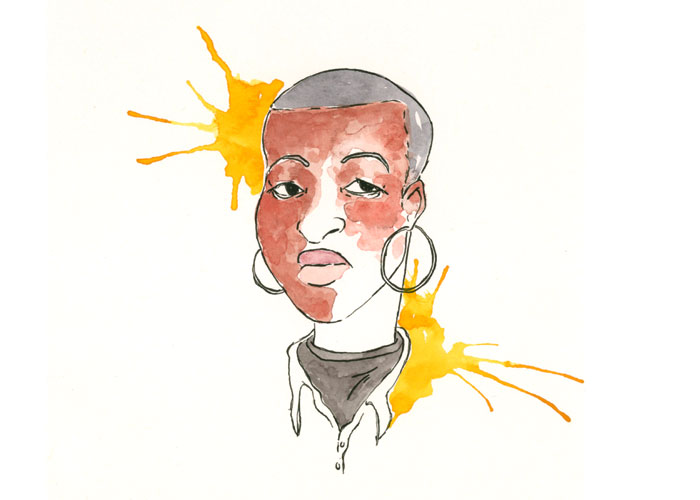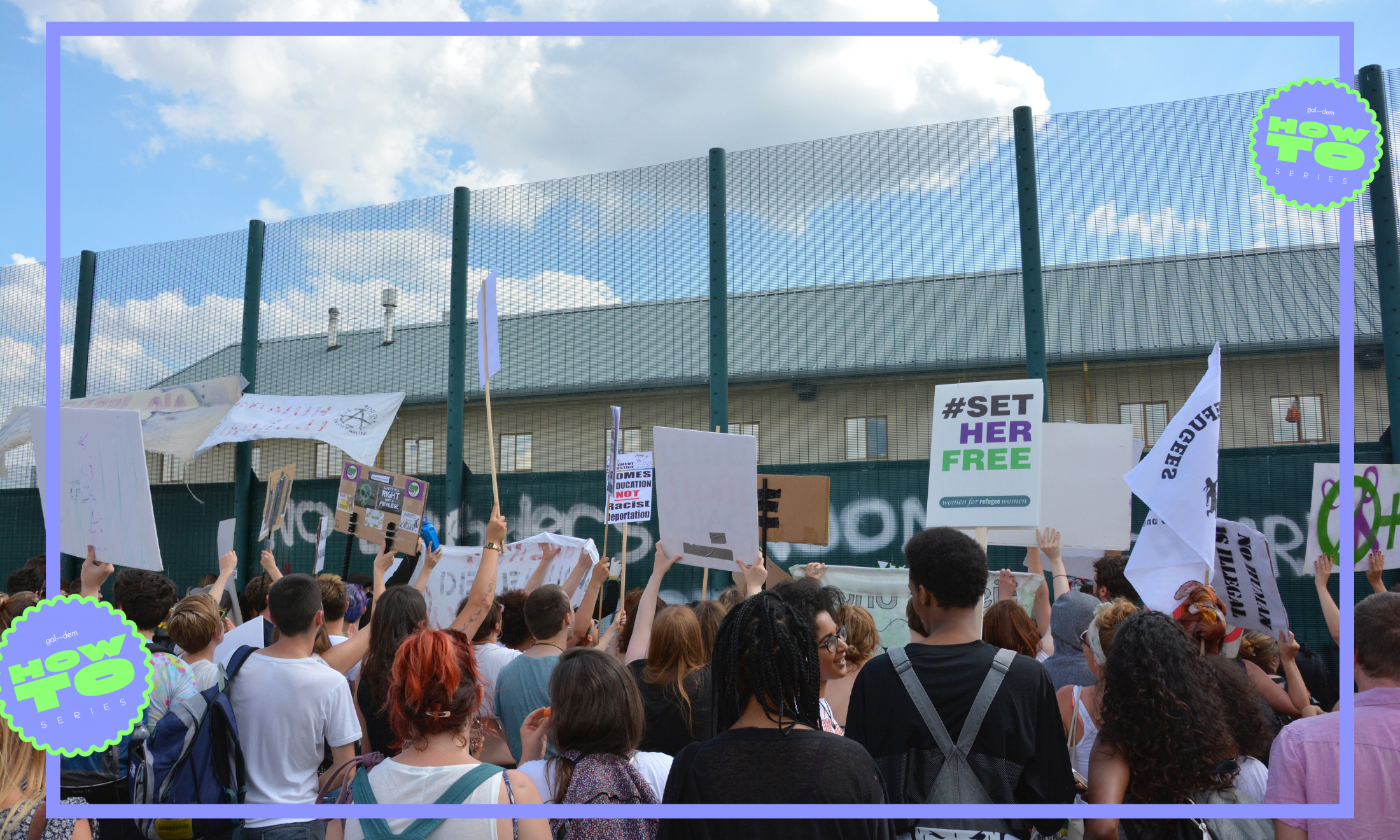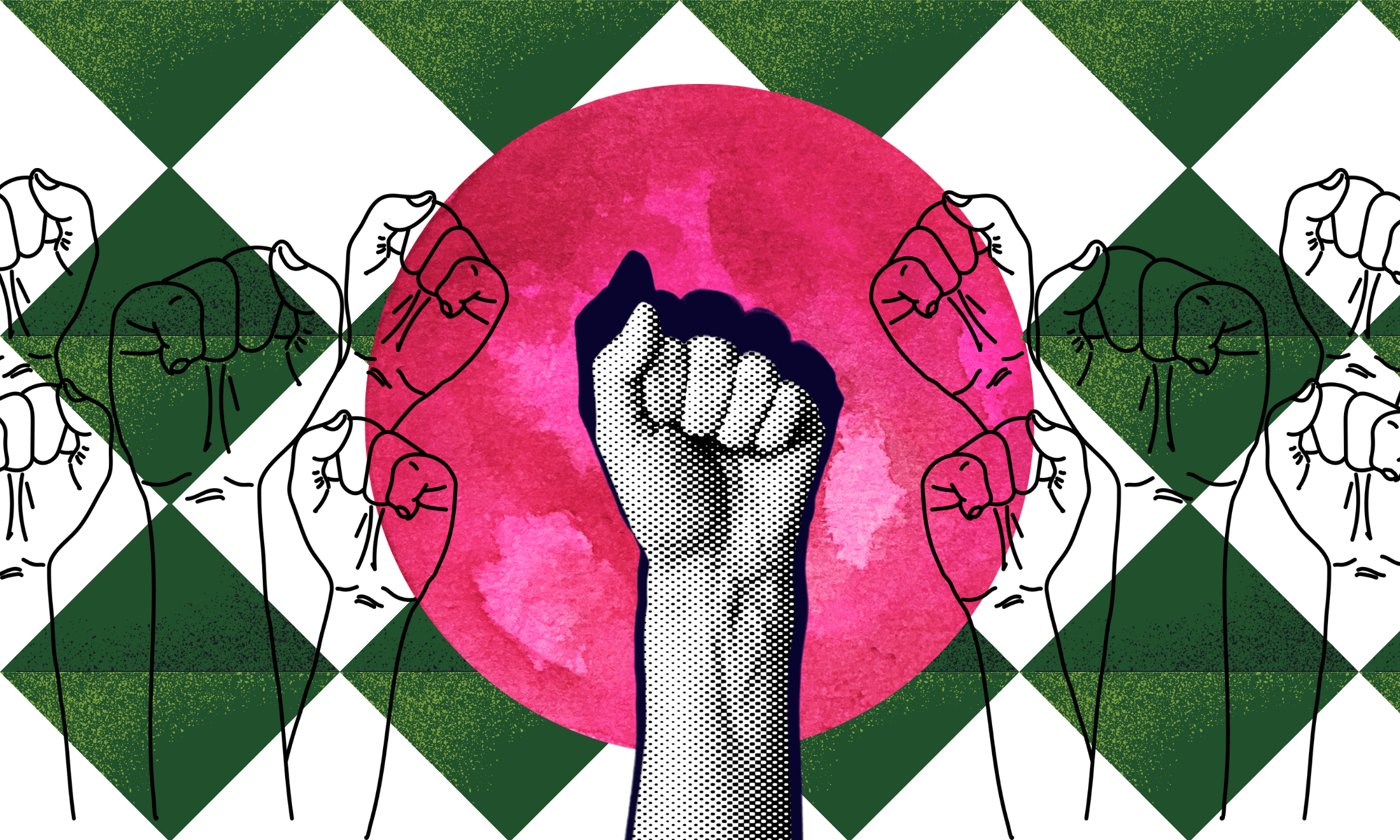
When I call Mabel she has been on hunger strike for two weeks. She sounds tired and frustrated, but her words are also laced with the resilience she has employed in order to survive in the UK’s notorious Yarl’s Wood Immigration Removal Centre (IRC). Mabel has been detained for three years – or as she remarks “three Christmases wasted inside here”. She is an activist who protests against detention from inside Yarl’s Wood, as well as against the routine charter flights which systematically deport plane-loads of people to former British colonies such as Jamaica and Nigeria, as well as to Eastern Europe.
Mabel’s protests are always met with reprisals – usually she is taken into an isolation cell in the “Kingfisher” wing of Yarl’s Wood. This does not deter her, as she tells us she feels it is her fundamental right to protest. But this does not affect how protestors in detention are treated.
“Every time I have to be locked away. This is not fair […] Every time they detain me to Kingfisher it’s like 10 managers and officers, and there is a camera that follows you […] I feel like a mass murderer! Like…did I really kill someone?! You feel humiliated, you feel down. You feel powerless, vulnerable. To be taken to that place and locked in there.”
This morning a charter flight left for Jamaica – it will have deported many people who have established lives in the UK, many of whom who have no strong connections with Jamaica. This is something she echoes, “It’s just not fair. There are people who are living here for many years, who are being separated from their children […] we are crying every day for our children […] we have to stand up and say what is wrong is wrong […] We just have to come together, and stand together, and fight the fight. We have to resist. We don’t agree with what they are doing to us.”
Yarl’s Wood is part of the UK’s vast detention estate which indefinitely incarcerates over 30,000 men, women and children a year. Yarl’s Wood is perhaps the centre most well-known by people outside of detention, as it has recently been the focus of a series of hugely successful demonstrations, as well as being embroiled in a series of abuse scandals since it opened. Guards from Serco (the private company outsourced to manage Yarl’s Wood) have been disciplined on numerous occasions for sexual misconduct such as rape of women in detention. In one incident, a guard caused a detainee to fall pregnant, and in another multiple women reported they were given the impression that if they flirted with guards, they would in exchange help them with their asylum claims.
In March 2015, Channel 4 obtained secret footage exposing guard’s contempt and verbally abusive treatment of women in Yarl’s Wood. In the footage one guard says of a detainee: “head-butt the bitch; I’d beat her up”. Another guard says “They’re beasties. They’re all animals. Caged animals. Take a stick with you and beat them up. Right?”.
Mabel elaborates on these claims drawing from her experience. She tells us that the treatment of women within Yarl’s Wood motivates her hunger strike:
“We are called ‘trolls’, our conversations are listened to, our emails are hacked. I especially am watched by officers like a hawk – what I’m doing, and what I’m not doing […] it’s a disgrace to be in Yarl’s Wood […] we feel vulnerable […] all they do is abuse their power and over control us”.
For an institution that is supposed to deter “illegal” migration, the government does a good job of keeping immigration detention under wraps, and deflecting the spotlight away from its abusive practices. This is highlighted through the rigorous screening that visitors must pass through to visit women in detention- friends and family must submit to a series of security checks, including giving fingerprints and providing proof of address. Journalists are not allowed to visit people in detention at all, and even a planned visit by Rashida Manjoo, UN Special Rapporteur on Violence against Women was blocked by the Home Office.
As a result many women in detention rely on their own internal networks of support and solidarity. Mabel talks about the sense of sisterhood inside Yarl’s Wood- she is in contact with people who have been released, and as a self-described long-standing detainee in the centre, she gives advice to women when they arrive:
“I have a lot of support from the girls. I call them my mothers and sisters. They are the sisters and mothers I never had in my life”.
We talk about previous protests: women in Yarl’s Wood have linked arms and barricaded rooms to successfully prevent deportation. Mabel laughs- she can’t tell me much because guards are listening to our phone conversation. She says: “We just have our own way. Making things in secret. I tried to stop the charter flight, so they had to lock me away. I cannot say everything!”.
The conversation then moves on to the UK’s Prime Minister Theresa May who in 2012 stated her intention to create a “hostile environment“ for migrants in the UK; indefinite incarceration in Yarl’s Wood is part of this landscape, and the chances of May jumping on a train to Bedford to see what conditions are like are slim. This is something Mabel thinks needs to change. “They just keep a blind eye about it […] they should hang their heads. They should come and put themselves in our shoes and see how we live here, not just sit on their backsides […] They just don’t want to talk about it […] I want Theresa May to come to Yarl’s Wood so I can tell her myself!”. She explodes into laughter as she tells us, “I want to sit her down and tell her they should show us compassion! We are human! Instead of showing us compassion and mercy they keep punishing us.”
Mabel’s story is fairly typical of people in detention: she has served a 15-month custodial sentence in Holloway prison, and on her release date was transferred to Yarl’s Wood where she has been for three years. There is a tendency in discourse around detention to talk about its inhumanity in detaining innocent people who “haven’t committed a crime”. This language should be interrogated- the prison and immigration systems are deeply intertwined, and both disproportionately incarcerate working class people of colour. Whilst the unpleasant stratification of detained people into those “worthy” of public sympathy (white people, pregnant women, survivors of torture, LGBT asylum seekers, mothers with children in the UK, children)- and those not worthy of sympathy (men of colour and foreign national offenders) create enticing media hooks and temporarily support some groups, in the same stroke it galvanises the existence of detention for others.
Of course individual stories should be heard, but always within the broader understanding that no person or group should be detained, irrespective of their circumstances. Mabel agrees:
“They say they will just detain people from certain groups. I don’t want anyone to be detained”.
I ask Mabel what she will do when (and not if) she is released. She says she wants to surprise her daughter- who she speaks to on the phone every day, but hasn’t seen for many years- and turn up at her school. She is very frank with her daughter about her situation, and on one occasion when she was released from isolation she told her: “Mummy was locked in Kingfisher, for protesting again”. Laughing she tells us her daughter had responded by asking “Mummy what’s wrong with protesting?”.
Mabel has a bail hearing this week- her sixth after five refusals. She tells us that she was so disappointed when she was refused the first and second time, but now she simply “hopes for the best and accepts the worst”. She attributes some of her strength to support groups Unity Centre and Movement for Justice, who give her courage to keep fighting her detention.
Mabel tells us: “I’m still standing on my two feet like a soldier, I fight for survival. I have to survive; I have survived so far- I’m a survivor. I’m a freedom fighter, you can call me whatever you like! Yarl’s Wood: shut it dooooooown! Shut it down!”.
To read more verbatim testimonies by people in detention on www.detainedvoices.com.
You can make donations to Movement for Justice, SOAS Detainee Support Group (SDS), Unity Centre and Roots to Return, supporting women in detention, deportees and families left behind.
To visit a person in UK immigration detention, and to offer emotional and practical casework support, contact your local detention centre visiting group.
This piece is part of gal-dem‘s #ShutThemDown series, exploring the UK’s immigration detention estate which indefinitely incarcerates over 30,000 people a year. A disproportionate percentage of the UK’s detention population are working class people of colour, and asylum seekers.

Britain’s policing was built on racism. Abolition is unavoidable

How Pakistan’s Khwaja Sira and transgender communities are fearing and fighting for their futures

Their anti-rape performance went viral globally. Now what?






